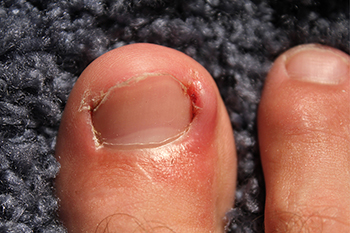
Proper toenail care is key for preventing painful conditions like ingrown toenails. Trimming your toenails straight across, rather than rounding the edges or cutting them too short, helps prevent the nail from growing into the surrounding skin. This simple step is effective in avoiding ingrown toenails, which can be worsened by wearing shoes that are too narrow or short, causing your big toe to rub against the shoe. Initially, an ingrown toenail might not cause any symptoms, but over time, it can become painful, red, and swollen, and may even become infected with pus forming under the nail. To avoid these complications and ensure effective treatment, it is important to consult with a podiatrist. Early intervention can simplify the treatment process and alleviate discomfort more efficiently. If you are experiencing signs of an ingrown toenail, it is suggested you make an appointment with a podiatrist for professional care.
Ingrown toenails can become painful if they are not treated properly. For more information about ingrown toenails, contact one of our providers of Gentle Touch Foot Medspa. Our staff members can provide the care you need to keep you pain-free and on your feet.
Ingrown Toenails
Ingrown toenails occur when a toenail grows sideways into the bed of the nail, causing pain, swelling, and possibly infection.
Causes
- Bacterial infections
- Improper nail cutting such as cutting it too short or not straight across
- Trauma to the toe, such as stubbing, which causes the nail to grow back irregularly
- Ill-fitting shoes that bunch the toes too close together
- Genetic predisposition
Prevention
Because ingrown toenails are not something found outside of shoe-wearing cultures, going barefoot as often as possible will decrease the likeliness of developing ingrown toenails. Wearing proper fitting shoes and using proper cutting techniques will also help decrease your risk of developing ingrown toenails.
Treatment
Ingrown toenails are a very treatable foot condition. In minor cases, soaking the affected area in salt or antibacterial soaps will not only help with the ingrown nail itself, but also help prevent any infections from occurring. In more severe cases, surgery is an option. In either case, speaking to your podiatrist about this condition will help you get a better understanding of specific treatment options that are right for you.
If you have any questions please feel free to contact our office located in Arlington, TX . We offer the newest diagnostic and treatment technologies for all your foot and ankle needs.

